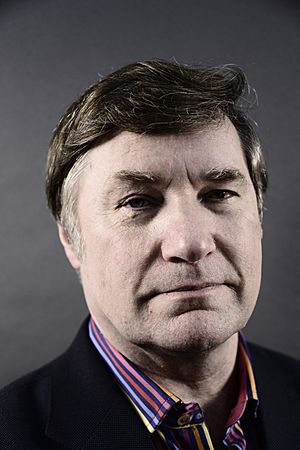John D. Barrow facts for kids
Quick facts for kids
John Barrow
|
|
|---|---|

John David Barrow
|
|
| Born |
John David Barrow
29 November 1952 London, England
|
| Died | 26 September 2020 (aged 67) |
| Alma mater | Van Mildert College, Durham (BSc) Magdalen College, Oxford (DPhil) |
| Awards | Italgas Prize (2003) Templeton Prize (2006) Michael Faraday Prize (2008) Kelvin Prize (2009) Zeeman Medal, London Mathematical Society and IMA (2011) Dirac Medal (2015) Gold Medal of the Royal Astronomical Society (2016), Giuseppe Occhialini Medal and Prize (2019) |
| Scientific career | |
| Fields | Physics Astronomy Mathematics Popular science |
| Institutions | University of Cambridge Gresham College University of California, Berkeley University of Oxford University of Sussex |
| Thesis | Non-Uniform Cosmological Models (1977) |
| Doctoral advisor | Dennis William Sciama |
| Doctoral students | Peter Coles David Wands |
John David Barrow (born November 29, 1952 – died September 26, 2020) was a brilliant English scientist. He studied the universe as a cosmologist, a theoretical physicist, and a mathematician. He was also a Fellow of the Royal Society (FRS), a top scientific honor.
John Barrow taught about math at Gresham College in London. He also wrote many books about science for everyone to understand. Besides his scientific work, he even wrote plays!
Contents
Learning and Studying
John Barrow went to school in Wembley and Ealing, England. He then studied mathematics and physics at the University of Durham. He earned his first degree there in 1974.
Later, in 1977, he got his doctorate degree in astrophysics from Magdalen College, Oxford. His teacher was a famous scientist named Dennis W. Sciama.
Career and Discoveries
After finishing his studies, John Barrow worked as a researcher at Christ Church, Oxford. He also spent two years at the University of California, Berkeley, studying astronomy.
In 1981, he joined the University of Sussex. There, he became a professor and led the Astronomy Centre. In 1999, he moved to the University of Cambridge. He became a professor in the Department of Applied Mathematics and Theoretical Physics.
From 2003 to 2007, he was the Gresham Professor of Astronomy. Then, from 2008 to 2011, he became the Gresham Professor of Geometry. It's very rare for someone to hold two different teaching positions at Gresham College!
Sharing Math with Everyone
Starting in 1999, John Barrow led the Millennium Mathematics Project (MMP) at Cambridge University. This project helps people learn to love and understand mathematics better. It also helps improve how math is taught.
In 2006, the MMP won a special award from Queen Elizabeth II. It was called the Queen's Anniversary Prize for Educational Achievement.
Books and Ideas
John Barrow wrote over 500 scientific papers. He also wrote 22 books for general readers. These books explained complex science ideas in a way that was easy to understand. His first book, The Left Hand of Creation, came out in 1983.
One of his famous books, The Anthropic Cosmological Principle, explored how life and the universe might be connected. He often wrote about big questions in physical cosmology, which is the study of the universe's origin and future.
John Barrow was great at making difficult ideas simple. He even came up with a funny idea called "the Groucho Marx Effect." He used a quote from Groucho Marx: "I wouldn't want to belong to any club that would accept me as a member."
Barrow applied this to the universe, saying: "A universe simple enough to be understood is too simple to produce a mind capable of understanding it." This means if the universe were too simple, we might not be smart enough to understand it!
Public Speaking and Plays
John Barrow gave talks in many important places. These included Downing Street (where the British Prime Minister lives), Windsor Castle, and even the Vatican. He also gave many talks to the general public.
In 2002, his play called Infinities was performed for the first time in Milan, Italy. The play later won an Italian theater award, the Premi Ubu 2002.
Awards and Recognition
John Barrow received many awards for his amazing work. In 2006, he won the Templeton Prize. This award is given to people who make progress in understanding spiritual realities. He won it for his writings about how life and the universe are connected.
In 2008, the Royal Society gave him the Faraday Prize. He became a Fellow of the Royal Society in 2003. He also became a member of the Academia Europaea in 2009.
Many universities gave him honorary doctorates, which are special degrees. These included the Universities of Hertfordshire, Sussex, Durham, South Wales, and Szczecin. He was also an Honorary Professor at the University of Nanjing in China.
In 2015, he received the Dirac Prize and Gold Medal from the Institute of Physics. The next year, in 2016, he was awarded the Gold Medal of the Royal Astronomical Society. These are very high honors in physics and astronomy.
Later Life
John Barrow passed away on September 26, 2020. He was 67 years old and had been battling colon cancer.
See also
 In Spanish: John David Barrow para niños
In Spanish: John David Barrow para niños

